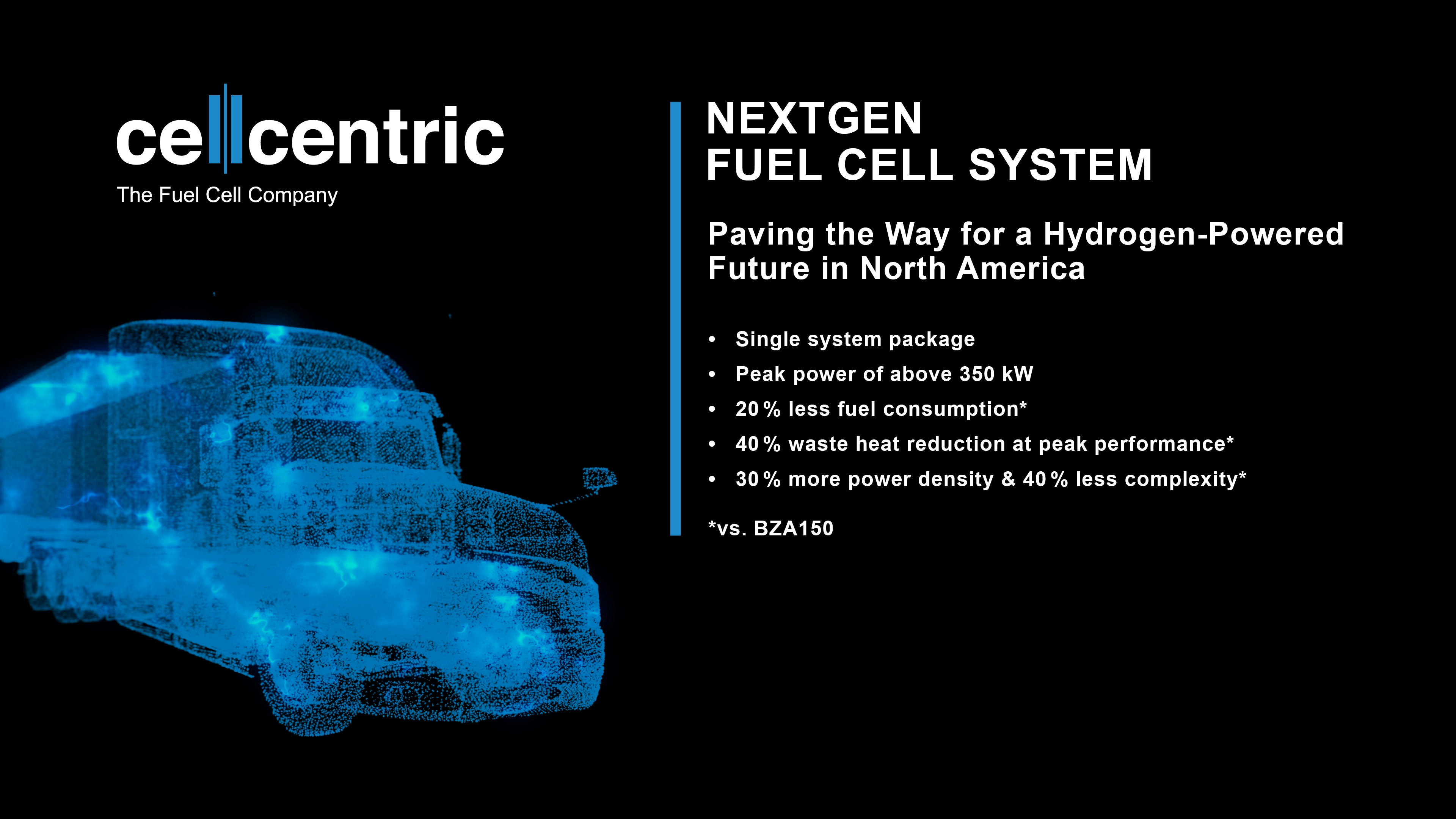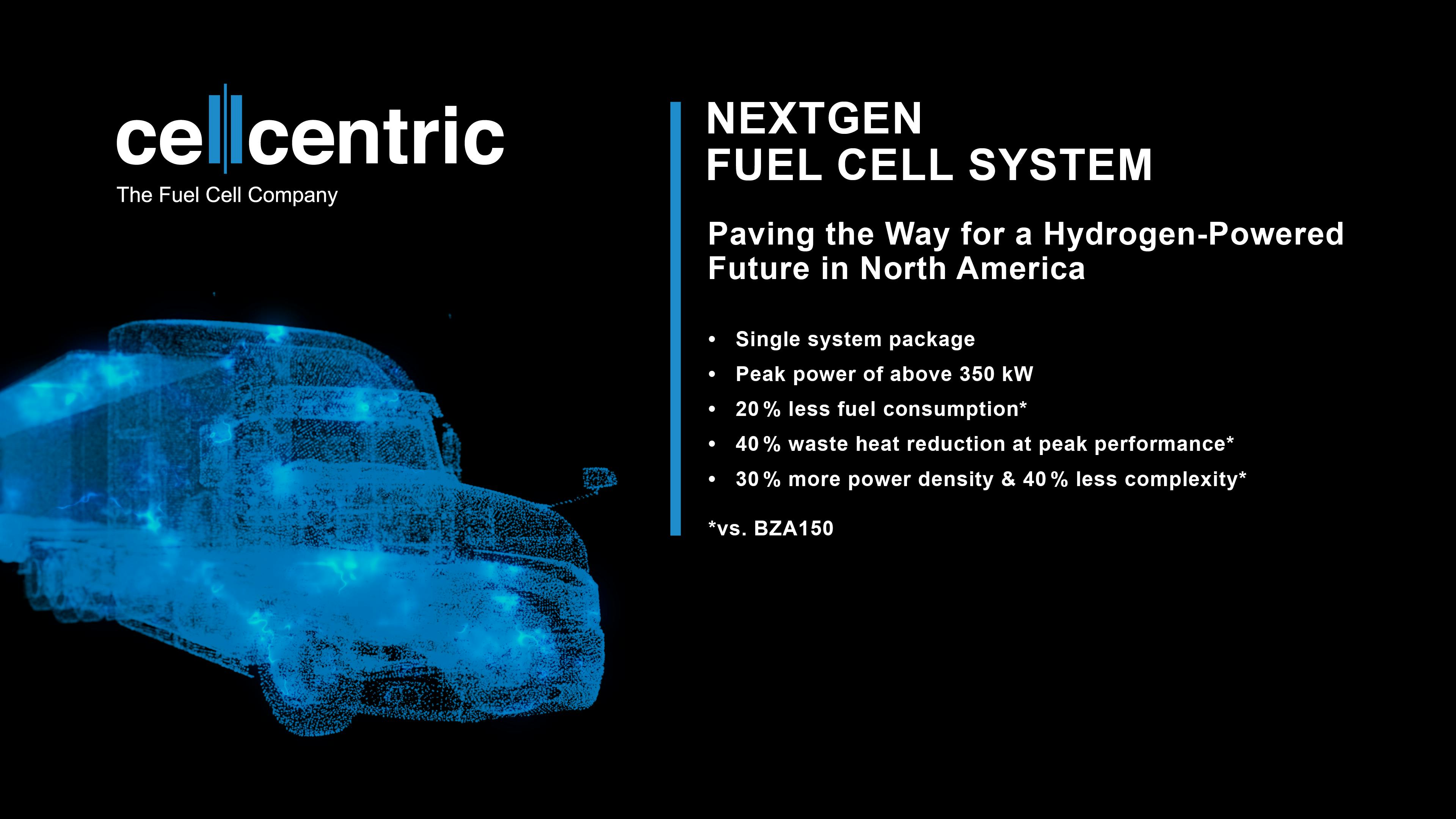cellcentric announces its NextGen fuel cell system tailored for long-haul trucks in Europe as well as in North America
- Highly integrated, compact and low-weight single system package solution
- A peak power above 350 kW – ideal for transportation requirements in both the European and the North American market
- Highly efficient with expected fuel consumption savings of 20 percent compared to the BZA150 generation, enabling leading total cost of ownership
- Reliable, robust, and sustainable beyond its life cycle

Fuel cell system specialist cellcentric announces its innovative NextGen fuel cell system tailored for long-haul trucks also in North America. As a new player with many years of expertise, the company with European and Canadian roots will announce its NextGen fuel cell system tailor-made for sustainable hydrogen-powered long-haul trucks for the first time at the trade fair, alongside its BZA150 fuel cell generation, which has been successfully tested in demanding field tests by Truck OEMs, Daimler Truck and Volvo Group. As a key element of the sustainable mobility transition in heavy goods transport and haulage trucking, the pioneering system was also developed with a particular focus on transportation requirements in North America (USMCA). The target is to start Series production at the end of the decade.
With a compact design and a net output of more than 350 kW as well as a low weight thanks to the highly integrated single system package solution, the NextGen system achieves the performance characteristics of comparable long-haul conventional heavy-duty trucks while reducing fuel consumption by 20 percent compared to the current generation BZA150 fuel cell generation. This is also enabled by a power density increase of 30 percent compared to the current generation. Especially relevant for easy truck vehicle integration: the system design and performance enables a 40 percent reduction in waste heat at peak load, thus substantially lowering cooling requirements for the truck – a key strategic product fit improvement.

“Our NextGen fuel cell system takes heavy-duty zero-emission transportation capability to a new level,” Nicholas Loughlan, CTO of cellcentric GmbH & Co. KG, says at the ACT Expo. “The performance features are tailored to meet the high demands of heavy-duty long-haul truck transport, which is highly sensitive to Total Cost of Ownership, in all aspects – but above all in fuel efficiency – without compromising on range, durability, or reliability. During development, we also specifically considered North American transportation requirements, especially regarding the long-haul segment. With its TCO Benchmark Performance, cellcentric’s NextGen is a zero-emission heavy-duty long-haul game changer that will allow us to play a significant role in shaping the sustainable transportation transition, also in this important market,” says Loughlan.
Reliable, robust, and sustainable in the long term
In addition, the cellcentric engineering teams have designed the NextGen fuel cell system to be as robust as is to be expected given the requirements of the challenging long-haul heavy-duty business: the system’s lifetime will deliver around 25,000 operating hours. The NextGen fuel cell system is also characterized by a high degree of sustainability beyond its useful life.
Fuel cell system also meets transportation requirements in the USMCA market
The strategic considerations taken in the product design specifically cater to the North American market: demand for hydrogen-based mobility solutions is growing in the USMCA market, triggered by the US subsidy measure in the form of the Inflation Reduction Act (IRA). In addition, the EPA’s recent final rule: “Greenhouse Gas Emissions Standards for Heavy-Duty Vehicles - Phase 3” will also help pave the way for heavy-duty zero emission vehicles in the US.
With this market outlook, cellcentric is driving the development of the highly TCO-optimized NextGen fuel cell system, taking the requirements of long-haul heavy-duty transportation in North America into account starting in the initial design phase.

